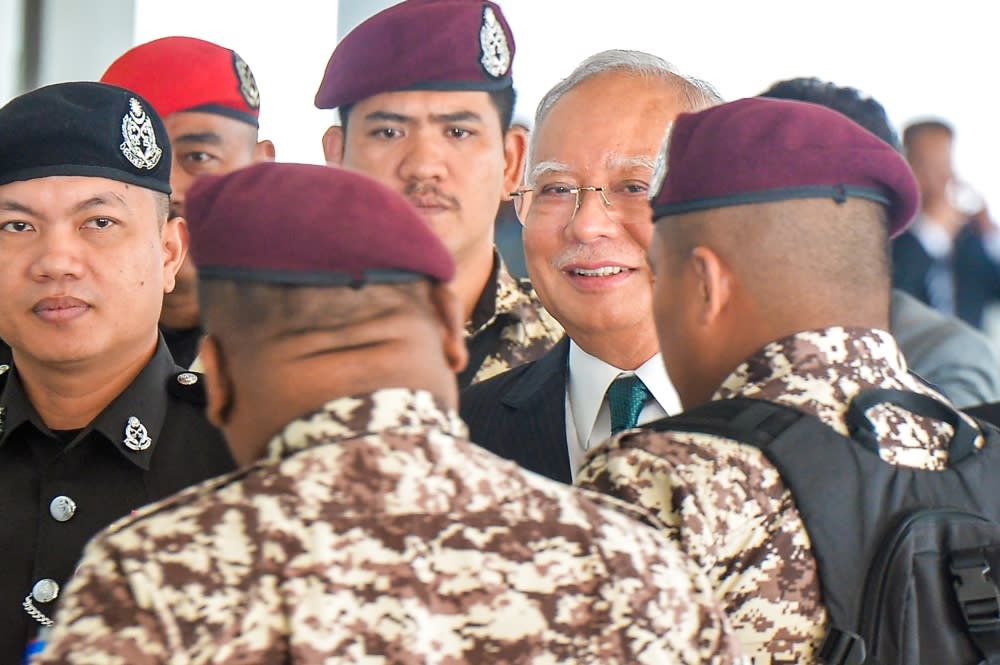Najib’s ‘blessing’ needed before 1MDB projects could be undertaken, Jasmine Loo tells court

KUALA LUMPUR, Feb 28 — Then prime minister Datuk Seri Najib Razak’s “blessing” was needed before the Finance Ministry-owned 1Malaysia Development Berhad (1MDB) could proceed with any projects, the company’s former in-house lawyer Jasmine Loo told the High Court today.
Testifying as the 50th prosecution witness in Najib’s trial over the misappropriation of RM2.27 billion of 1MDB funds, Loo said this appeared to be how 1MDB was operating then.
“It seemed to be the practice at the time I joined that everything needed to be floated up to the PM of Malaysia who was also our chairman of board of advisers for his blessing before any project could have been undertaken. So to me, that indicated that whenever 1MDB was going to undertake, it needed to have endorsement from prime minister of Malaysia,” the 50-year-old former lawyer said.
She was explaining the significance of Najib’s role as 1MDB’s board of advisers’ chairman, based on Article 93 in 1MDB’s company constitution which stated that this role is to be filled by the prime minister.
Loo, who was 1MDB general counsel from May 2011 to November 2013, today repeatedly emphasised that Najib was the same individual who was holding different roles at the same time — prime minister; representative of 1MDB’s shareholder Minister of Finance Incorporated (MoF Inc) via his role as finance minister; and as chairman of 1MDB’s board of advisers due to his role as prime minister.
While confirming that she had somewhat familiarised herself with 1MDB’s company constitution or Memorandum and Articles of Association (M&A), she said she had relied heavily on company secretary Goh Gaik Kim on the drafting of 1MDB documents such as circular resolutions, while also confirming that Goh was not a lawyer.
While agreeing that she would be responsible for ensuring 1MDB documentation was legally sound as she was the 1MDB general counsel, Loo said the company secretary would have referred to her if there were any issues with the documents and that the company secretary would have prepared documents if she was clear with the form or format.
Loo agreed with Shafee that generally under the company law, the board of directors is the main organ of the company and that the board’s responsibility is to the company and not to the shareholder. While agreeing that generally the board of directors would have to decide on major issues before it is sent to the shareholder, she said this was not how it happened in 1MDB.
While Shafee argued that the 1MDB board of advisers can only be invoked upon request by the board of directors if advice was needed and that the company constitution did not say individual directors could sought such advice, Loo argued that the 1MDB CEO is a director and that the CEO could seek advice from the highest person in the organisation — which would be the chairman of board of advisers.
While Shafee had argued that the chairman of the board of advisers does not have special powers to make decisions on his own, Loo later insisted that the “practice” in 1MDB “was to refer to the prime minister of Malaysia who was also the chairman of board of advisers”.
Shafee suggested that Loo had failed her duty as 1MDB general counsel to advise the company that this was illegal, but she disagreed.
Shafee then examined Article 117 in 1MDB’s company constitution, where prior approval by the prime minister is required for these key events or key decisions to take effect, namely amendments to the company constitution; the appointment or removal of senior 1MDB management personnel; or decisions affecting national interest, national security or government policies.
Loo said Article 117 had been invoked during her tenure in 1MDB such as for appointments of senior management including the CEO and for financial commitment decisions, but said she was not sure if there was any document in 1MDB which had specifically cited Article 117 as being invoked.
When Shafee said there is no such 1MDB document which mentioned Article 117 as being invoked, Loo said this was what was carried out in practice when 1MDB sought Najib’s approval as the chairman of the board of advisers or when Najib’s approval as the shareholder’s representative is obtained.
When Shafee said such roles are different from the role of the prime minister, Loo disagreed by saying that these are not different role as all the roles were undertaken by one individual.
If different individuals had held the positions of prime minister or finance minister or chairman of 1MDB’s board of advisers or as its shareholder’s representative, Loo said she would have taken a different approach to seeking approval separately from those holding these different positions.
Shafee argued that the 1MDB documents should have clearly stated that Article 117 is being invoked and Najib’s approval was being sought in his role as prime minister.
But Loo said this was not necessarily required as he was “one individual who was holding all three roles at that time” and that “in substance it was that decision of one individual who covered all these provisions including Article 117”.
Loo said she was just following the practice in 1MDB and she did not think the practice was wrong as in substance it was the same individual who was signing off on 1MDB decisions.
Shafee then suggested that she was intentionally ignoring the rules in the company constitution as she was part of a conspiracy together with now-fugitive Low Taek Jho to hoodwink 1MDB funds, but she disagreed.
Najib’s 1MDB trial before trial judge Datuk Collin Lawrence Sequerah is scheduled to resume on March 14, with Shafee expected to continue cross-examining Loo.




